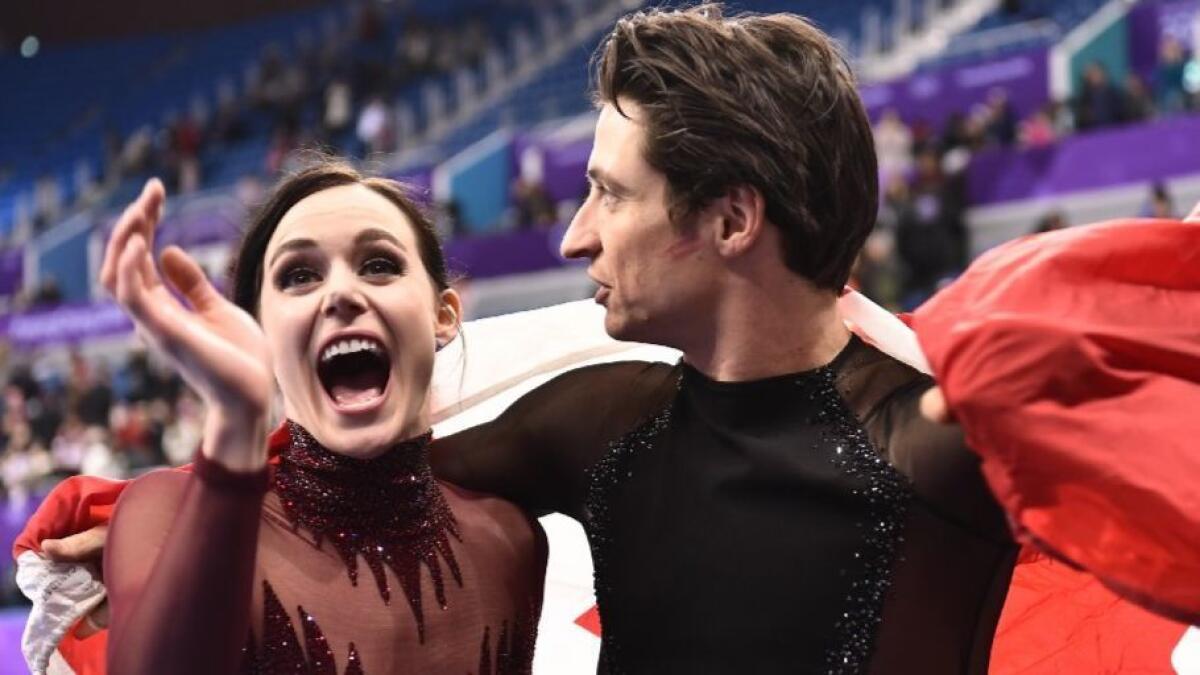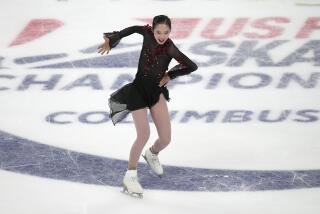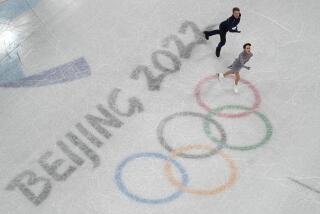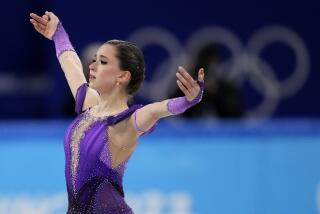Column:: Virtue and Moir set record and Shibutani siblings win bronze in ice dance

Scott Moir said his and partner Tessa Virtue’s free dance performance on Tuesday was personal, for each other, the best way they knew to honor the ice dance collaboration they’ve enjoyed for the better part of two decades. By the time the Canadian couple completed their sultry routine to music from “Moulin Rouge,” the moment belonged not just to them, but to the ages.
Virtue and Moir held off an exquisitely enthralling performance by Gabriella Papadakis and Guillaume Cizeron of France to win the ice dance gold medal — their fifth in the sport — and set a record for the most Olympic medals won in figure skating. The previous Winter Games record for figure skating medals was four, shared by Sweden’s Gillis Grafstrom in the 1920s and 1930s and Russia’s Evgeny Plushenko. Virtue and Moir won ice dance gold in 2010 and ice dance silver in 2014 in addition to contributing to Canada’s team silver medal in 2014 and team gold medal here.
With three gold medals, Virtue and Moir tied Grafstrom, Irina Rodnina, and Sonja Henie for most gold medals won in figure skating. That’s elite company. “We skated with each other in mind the whole way and we skated with our hearts,” Moir said after he and Virtue earned the second-highest scored free dance to compile 206.07 points and edge out the French duo’s total score of 205.28. “It’s extremely fulfilling.”
Another kind of history was made by the American brother and sister duo of Maia and Alex Shibutani, whose rise from fourth place after the short dance to third place gave them the distinction of being the first skaters of Asian descent to win an individual ice dance medal since the discipline was added to the Olympic program in 1976. The siblings had contributed to the U.S. team’s bronze-medal performance last week by skating both their short dance and free skate routines.
Maia, 23, and Alex, 26, switched places with American teammates Madison Hubbell and Zachary Donohue, who lost points on some sloppy twizzles (one-footed turns) and on a late stumble that Donohue couldn’t explain. The Shibutanis, whose heritage is Japanese, finished third with 192.59 points, to 187.69 for Hubbell and Donohue. The third American couple, Redondo Beach native Madison Chock and partner Evan Bates, dropped from seventh to ninth after both fell on the entrance to a combination spin.
“We kind of knew right away, when we finished, that we had given it away,” Hubbell said. “It’s a pretty hard feeling. As much as the Olympics is about amazing dream moments, there’s a lot more Olympians that have this moment. And certainly it’s something that’s difficult, but as much as this is my dream, it was our dream to be here and we still got that dream.”
Maia Shibutani has spoken about persevering in the sport even though she never saw other ice dancers who looked like her and her brother when they began skating in the New York area 13 years ago. She became emotional on Tuesday when she recalled the derision she and her brother have faced for skating together in a discipline that often requires skaters to tell a love story or to portray characters who are romantically involved.
“It’s incredibly special,” Maia said, “and along the way of our career there have been a lot people that have told us that maybe we shouldn’t do it, that siblings shouldn’t be a team. But we believed in ourselves and we accomplished this together, and I’m so proud of all the work that we’ve done.”
They had every reason to be proud after skating to “Paradise” by Coldplay at a good pace that built up to a dramatic ending. They are a better and more sophisticated duo than they were in finishing ninth at the 2014 Sochi Winter Games, and they’re only the second siblings to team up for an Olympic ice dance medal, after Isabelle and Paul Duchesnay won silver for France in 1992.
“It’s incredible. I don’t think anyone would have expected it of us,” Alex said. “I know no one expected it of us but we’ve always believed in ourselves and we’ve always dreamed that this was possible and we knew we had it in us.”
Virtue and Moir were the final skaters. Papadakis — whose costume had slipped off during the short dance but stayed intact on Tuesday — and Cizeron had set a monumental challenge with their program to Piano Sonata and Moonlight Sonata, forcing the Canadians to get a personal-best score to win. Virtue and Moir did that, earning 122.40 points and leaving Papadakis wistful.
“We knew it was possible and we really wanted it but we did our best. We have nothing to regret,” she said of not having won gold.
Virtue and Moir left nothing undone in the sport. This likely was their competitive finale, though they said they’ll wait awhile before making any announcements. If this is it, they left their fans and the skating world wanting more, an ideal way to depart.
“I am thrilled with this competition. That performance was really special and truly memorable,” Virtue said. “The gold medal is the cherry on the cake.”
Follow Helene Elliott on Twitter @helenenothelen
More to Read
Go beyond the scoreboard
Get the latest on L.A.'s teams in the daily Sports Report newsletter.
You may occasionally receive promotional content from the Los Angeles Times.






